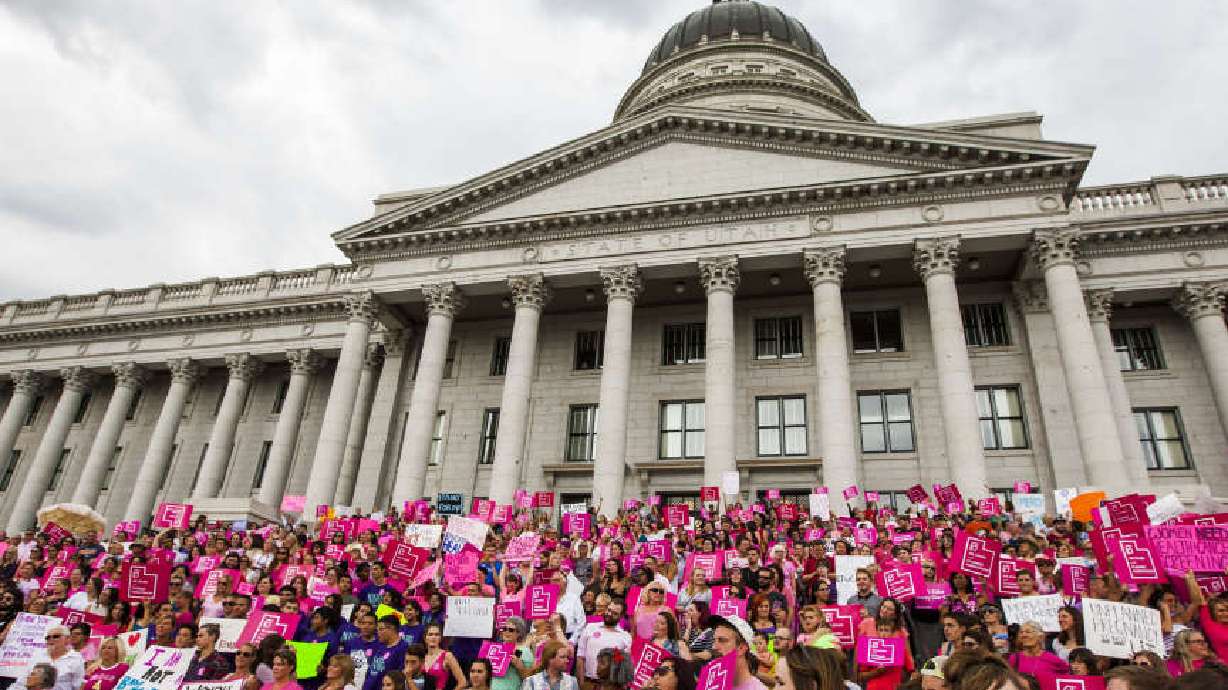Estimated read time: 4-5 minutes
This archived news story is available only for your personal, non-commercial use. Information in the story may be outdated or superseded by additional information. Reading or replaying the story in its archived form does not constitute a republication of the story.
SALT LAKE CITY — A federal judge appears poised to strike down part of a disputed new state election law that defines how political parties choose candidates for elected office.
U.S. District Judge David Nuffer signaled Tuesday that he intends to find forcing parties to hold open primary elections is unconstitutional. He noted that every other court has found that requirement violates the First Amendment.
"Honestly, that's how I think I'm ruling," he said after hearing arguments from the Utah Republican Party, the Utah Constitution Party and the state.
Nuffer will issue a written decision in the coming days, which could potentially end the lawsuit that the Utah GOP filed against the state. The law includes a clause that says if part of it is struck down, the remainder stands.
Assistant attorney general David Wolfe declined to comment until the ruling comes out. The state could appeal.
Utah Republican Party Chairman James Evans said the judge's inclination "bolsters our legal confidence" and further clarifies the party's position.
"I'm satisfied that our claims are what we say they are, which is that the statute is unconstitutional. But also that as the party, we get to decide our membership and we get to decide how we will proceed in nominating our candidates," he said.
Under the law, organizations that register with the state as a "qualified political party" — which the GOP did — must allow candidates a route to the primary ballot that bypasses the traditional caucus and convention system, specifically gathering a requisite number of signatures for a particular office. Parties must also open their primaries to unaffiliated voters.
But Evans said after the hearing that the law gives qualified political parties the option to choose the convention system, signature gathering or both, and the Utah GOP chose only the convention system.
Sen. Todd Weiler, R-Woods Cross, said Evans is "playing a little fast and loose with the facts and the law."
The candidate, not the party, decides which path to take to get on the primary ballot, he said.
"The law is clearly drafted so that a candidate who's running under a qualified political party can choose one or the other or both," he said. "There's not a single provision in that law that says the party can choose one or the other or both. That's a choice for the candidate."
As for the judge striking down the open primary provision, Weiler said that would be like pulling a string on a sweater "because the question is where do you stop?"
If unaffiliated voters — which make up about 40 percent of Utahns — can't vote in a primary, it doesn't make sense to be able to sign a candidate's petition to get on the ballot, he said.
The law is clearly drafted so that a candidate who's running under a qualified political party can choose one or the other or both. There's not a single provision in that law that says the party can choose one or the other or both. That's a choice for the candidate.
–Sen. Todd Weiler, R-Woods Cross
Rich McKeown, co-chairman of the Count My Vote initiative, said removing the open primary provision would limit Utahns' ability to participate.
"I think there's wisdom in opening these up. I think it's a good component of the legislation. I wish the judge determined that it was constitutional. I think it's very specific and allows more people to vote," he said.
McKeown said Evans extrapolating from the judge's comments that the Republican Party doesn't have to allow candidates to gather signatures to get on the ballot circumvents the letter and spirit of the law.
"They are narrow-minded in the way that they are approaching this. Instead of creating clarity, what they're doing is creating chaos for existing candidates and incumbents at this point in time. They just simply are becoming the part of exclusivity as opposed to the part of inclusivity," he said.
The Utah GOP argued in court documents that allowing unaffiliated voters to cast ballots in its primary election would result in nonparty members electing its nominees for the general election. The party also says it would change its message and dilute its ideology.
The state contends the Republican Party hasn't shown if and how many independent voters would participate in the GOP primary and has no concrete evidence of how it would impact the outcome or the party's message.
Count My Vote two years ago set out to increase voter participation by changing how political parties choose candidates. Initiative supporters dropped the statewide petition drive calling for a referendum on a direct primary election in exchange for getting an alternative path to the ballot.
As a compromise, the Republican-controlled Utah Legislature passed SB54 to let parties keep the state's unique caucus and convention system for choosing nominees, but also allow candidates to collect signatures to get on the primary ballot.
The Utah GOP says it was not involved in the deal and asked the court last December to strike down the law.









